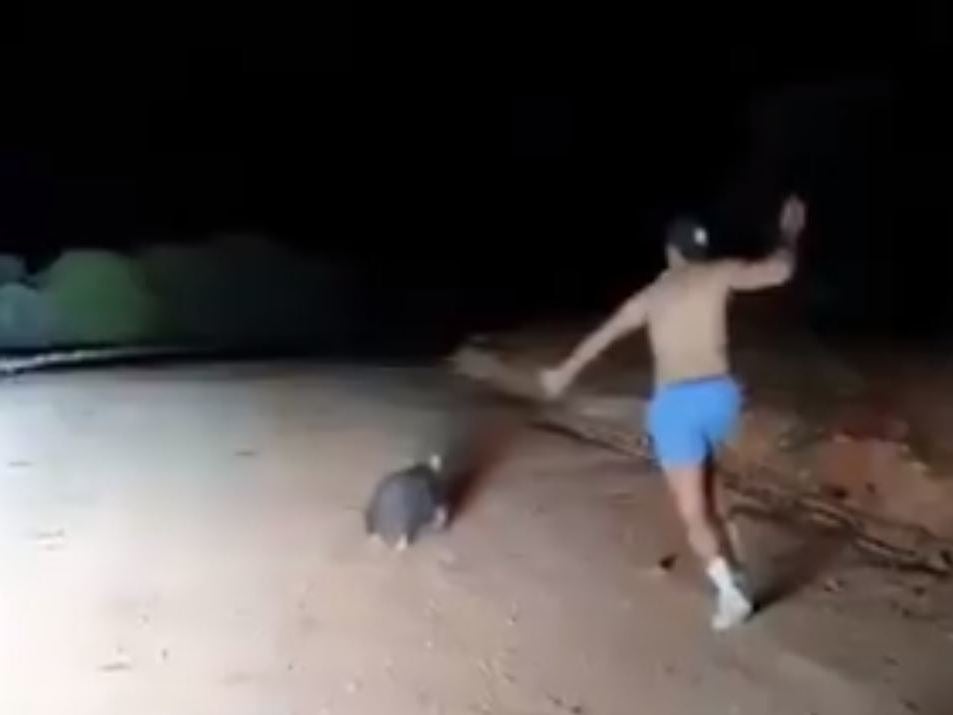Police officer who stoned wombat to death escapes punishment
Investigation into South Australian Police officer Waylon Johncock found ‘no reasonable prospect of conviction’, despite widespread condemnation

Your support helps us to tell the story
From reproductive rights to climate change to Big Tech, The Independent is on the ground when the story is developing. Whether it's investigating the financials of Elon Musk's pro-Trump PAC or producing our latest documentary, 'The A Word', which shines a light on the American women fighting for reproductive rights, we know how important it is to parse out the facts from the messaging.
At such a critical moment in US history, we need reporters on the ground. Your donation allows us to keep sending journalists to speak to both sides of the story.
The Independent is trusted by Americans across the entire political spectrum. And unlike many other quality news outlets, we choose not to lock Americans out of our reporting and analysis with paywalls. We believe quality journalism should be available to everyone, paid for by those who can afford it.
Your support makes all the difference.An off-duty Australian police officer who stoned a wombat to death will not lose his job or face criminal charges, local authorities have said.
Waylon Johncock was filmed in early October following the animal along a dirt road in south-west Australia before throwing rocks at it.
It later emerged that Mr Johncock, who can also be seen laughing in the video, is an officer with the South Australian police force, which subsequently launched criminal and disciplinary investigations.
At the time, commissioner Grant Stevens described Mr Johncock’s behaviour as “totally abhorrent”.
“I want to reassure everybody that the actions in the video do not align with the values and behaviours I expect from my employees,” he said.
But Mr Stevens announced today that no action will be taken against Mr Johncock, saying that “as a traditional Aboriginal man”, the officer had an “appropriate permit to hunt wombats for food”.
“Whilst distressing to many who viewed the video, it has been established that the senior community constable’s actions were not inconsistent with traditional hunting practices,” Mr Stevens said in his statement.
“I have been advised that the wombat in the video was killed and eaten. The video shown on social media was part of a longer video that has not been released.”
Legal advice provided by the office of the director of public prosecutions established there “there would be no reasonable prospect of a conviction” against Mr Johncock, who has since been provided with “managerial advice and counselling regarding the implications of social media”.
Mr Stevens said he stood by his original criticism, but insisted that his officer “is well regarded and respected by his colleagues, peers, supervisors, managers and the local community in which he serves”.
He added: “I still find some of the content of the video disturbing – I take personal displeasure in seeing any animal distressed, or being killed as the wombat was killed.
“I know many shared in my shock and dismay. I gave a public undertaking there would be a robust and thorough investigation, and that I would provide advice regarding the outcome of that investigation.
“It is clear from the outpouring of emotions that some may question the outcome of this investigation. I can reassure everyone that the most thorough of investigations has been undertaken in this matter.
“This matter has now been finalised and is complete.”
Calls have been made to review the laws and practices surrounding the hunting of animals in Australia.
The RSPCA’s South Australian branch said “the use of inhumane methods to kill animals – whether for subsistence or not – is unacceptable”.
The incident has also left Aboriginal communities in the country’s south-west divided. Although some have sought to defend the tradition of hunting wombats, others have criticised Mr Johncock for the lack of respect he showed while killing the creature.
The force’s announcement regarding the outcome of their investigation was shared on Facebook and has since attracted thousands of critical comments.
Join our commenting forum
Join thought-provoking conversations, follow other Independent readers and see their replies
Comments